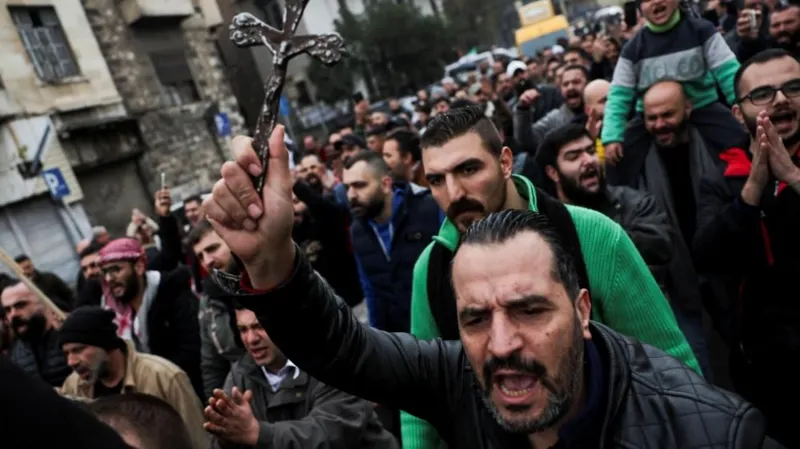Tensions have escalated in Syria after a Christmas tree was set ablaze in Suqaylabiyah, a predominantly Christian town in central Syria. The incident has sparked nationwide protests and raised concerns about the rights of religious and ethnic minorities under the new Islamist leadership.
The arson attack, captured on video and shared widely on social media, showed masked men dousing the tree in an unidentified liquid before it erupted in flames. The timing of the attack, on the eve of Christmas celebrations, has deepened fears among Syria’s Christian communities.
Hayat Tahrir al-Sham (HTS), the Islamist faction now leading Syria following the fall of President Bashar al-Assad’s regime earlier this month, confirmed that foreign fighters were responsible for the incident. HTS representatives have since pledged to protect the rights and freedoms of all Syrians, including minorities.
In response to the burning, a religious leader from HTS addressed a crowd in Suqaylabiyah, promising to repair the tree and expressing solidarity by holding up a cross — a symbolic gesture that surprised many given HTS’s Islamist roots.
Protests have since spread to other parts of Syria, including the capital, Damascus. Demonstrators in the Kassa and Bab Touma neighborhoods voiced their anger, with chants like Syria is free, non-Syrians should leave” and “we will sacrifice our souls for our cross.
Georges, a Christian protester, told AFP, “If we’re not allowed to live our Christian faith in our country, as we used to, then we don’t belong here anymore.
Syria, a mosaic of ethnic and religious groups including Christians, Druze, Kurds, and Alawites, is navigating uncharted territory following the ousting of Bashar al-Assad. HTS, originally a jihadist group, has pledged to adopt a more inclusive approach to governance. However, the attack in Suqaylabiyah has cast doubt on these promises.
Ahmed al-Sharaa, the HTS leader, recently announced a merger of all revolutionary factions under the Ministry of Defence, signaling efforts to consolidate power and streamline governance. Prime Minister Mohammed al-Bashir emphasized restructuring the ministry to integrate rebel fighters.

While the announcement speaks of unity, questions remain about the inclusion of all factions, especially those opposed to HTS or operating with tenuous alliances.
The incident in Suqaylabiyah underscores the challenges HTS faces in maintaining security, fostering unity, and protecting minorities. The group, still designated a terrorist organization by the UN and Western powers, has been making overtures for legitimacy, including diplomatic engagements with the US.
On Friday, the US lifted a $10 million bounty on Ahmed al-Sharaa, signaling a potential shift in relations, though Washington continues its military operations in Syria. The US confirmed an airstrike in Deir Ezzor that killed two Islamic State operatives on the same day.
The presence of foreign fighters and extremists, combined with lingering regime loyalists, poses a significant challenge to the new Islamic leadership. Ensuring the security and rights of minorities like Christians will be a litmus test for HTS’s ability to govern inclusively and maintain Syria’s fragile stability.
The events in Suqaylabiyah have put the spotlight on HTS’s leadership, with many Syrians and international observers watching closely to see if its promises of a unified Syria for all citizens will hold true.


